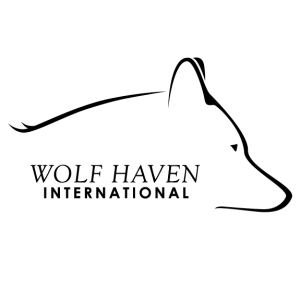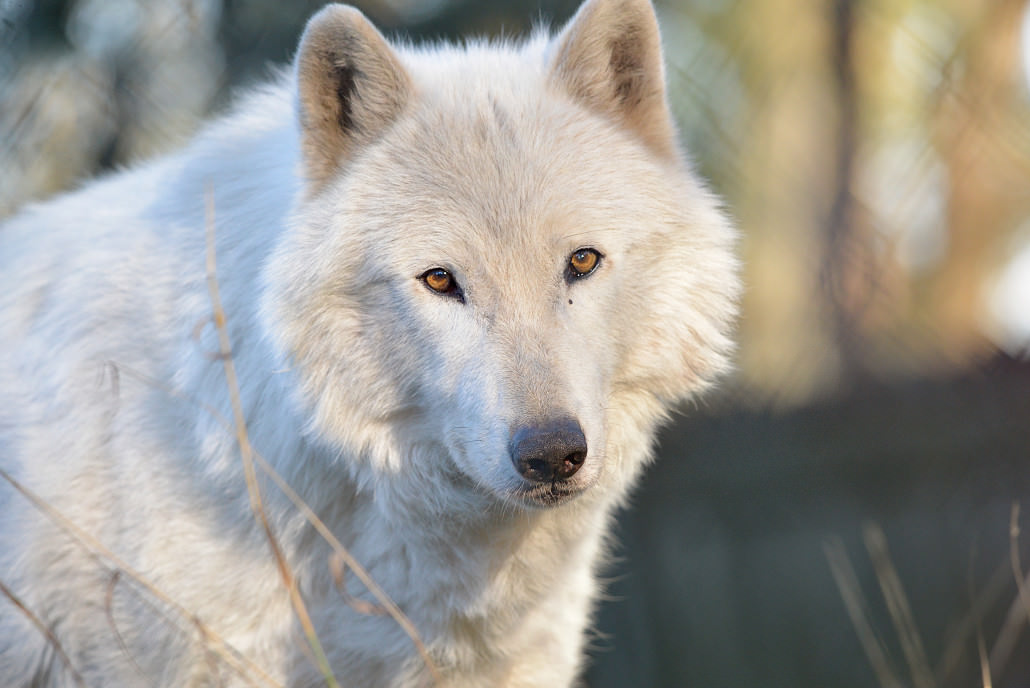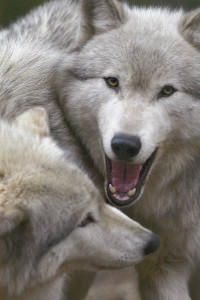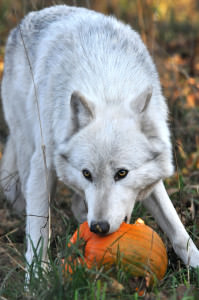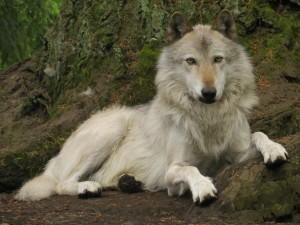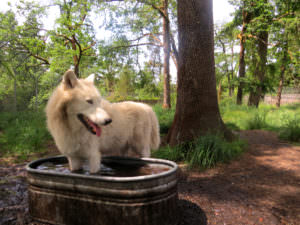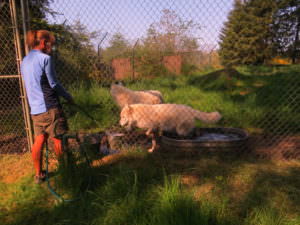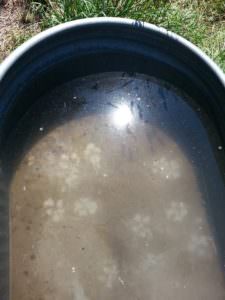Posts
Saying good-bye to Spruce
by Wendy Spencer, Director of Animal Care
Saying goodbye to one of our friends is never easy, so it is with a heavy heart I write to let you know that Spruce has passed away.
We have been watching a decline in his condition over the course of the last year and though he had been enjoying relatively good quality of life, we knew that his time would be drawing near. During the morning walk-through the sanctuary on Saturday, March 12, Spruce was not at the front of his enclosure waiting for food like he has been every other day for the last 13 years.
Right away, we knew something was not right. After checking his shelters and still finding no sign of him, we checked his natural den and discovered him lying near the entrance, head poking out but the rest of his body inside. He was alert and responsive but too weak to get himself out. Animal Care staff chemically immobilized him to help him out of his den and since we had him in hand, we took him to the vet for a full diagnostic. Sadly, x-rays revealed fluid in one of his lung fields as well as what appeared to be cancer. Additionally, his other organs did not look healthy and blood work indicated that his liver was shutting down. The kindest thing we could do for our friend was to help him along, so Spruce was humanely euthanized at the clinic without every waking up from anesthesia.
Spruce’s sisters Cricket and Jinkies passed away a few years ago from similar cardio-respiratory conditions, so we suspect there might have been something hereditary in this family. Spruce is survived by three remaining littermates, (Myta, Chai and Bart), who at this point show no signs of any health issues. We are hopeful that whatever afflicted Spruce and his sisters is not present in the rest of the group.
Spruce and his entire family of eight were rescued from private ownership in 2003, when Spruce and his siblings were just seven months old. We have had the honor and privilege of watching him mature into a larger-than-life presence in the sanctuary. He lived most of his adult life on the public visitor route and because of his comfort level around staff and visitors (as well as his stunning looks), he became one of the most photographed wolves in our sanctuary.
Though he slowed down the last few years, Spruce was one of the most vocal and gregarious animals here and because of his antics, he endeared himself to all who had the honor of knowing him. He has left an indelible mark on our hearts and minds. And although it is bittersweet each time I walk by his now vacant enclosure, I cannot help but smile a little as I think of him and the joy of his fullness of being. Rest in peace, friend.
Riley's spirit continues in our hearts
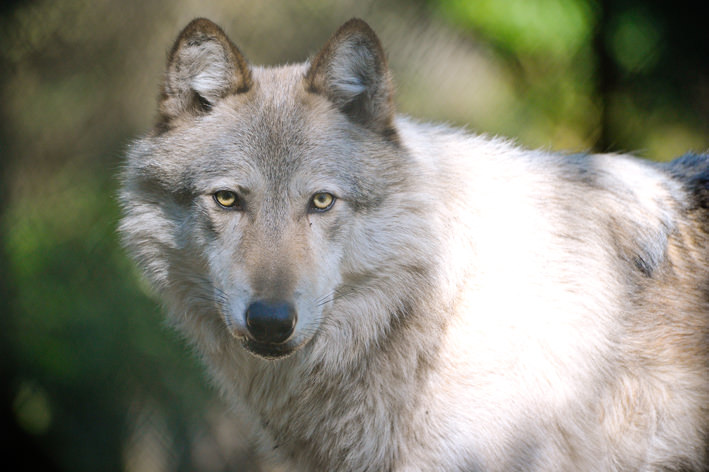
Our friend Riley
photo by Julie Lawrence/Wolf Haven International
It is with a heavy heart that Wolf Haven writes that our friend Riley passed away earlier this month. Riley was only seven years old and was healthy and happy. His passing was very sudden and unexpected and left us all in a state of great sadness.
During a routine morning walk through the sanctuary by animal care staff on Friday December 12, Riley was found lying on his side not moving. It was apparent that he had passed away during the night. The day before he died, Riley was his usual happy, playful self. Two weeks earlier he had been introduced to a new companion, a female wolf named Ukiah, whose brother had died. The two of them were forming a fast friendship and could be seen nose to nose wagging their tails, playing a little and lying quietly next to each other in the middle of their enclosure.
The day he passed he had been given a special treat, a small sheep carcass donated to Wolf Haven by a local farmer. Riley did not want to share the carcass with Ukiah at first. He kept chasing her off until he ate his fill and then he moved away to allow Ukiah to enjoy as well.
When Riley was found the following morning, his abdomen was acutely distended; an indication of gastric dilation volvulus (GDV), where the stomach fills with gas and twists on itself. We consulted our veterinarian about performing a necropsy in order to determine the cause of his death. The veterinarian felt that given all of the symptoms and the large amount of food Riley had quickly ingested the day before, a necropsy was not necessary. She explained that GDV, also known as torsion, evolves extremely quickly, making it nearly impossible to prevent and very difficult to treat successfully, especially in wild canids. Riley (as well as our other wolves) received carcasses on a regular basis without any ill-effects, so we are not sure why on this particular day it turned out to have fatal consequences.
It has been an honor to care for Riley and watch him blossom with his first companion Siri and his burgeoning new friendship with Ukiah. He was a little shy and was also playful and mischievous. He will be greatly missed.
Thank you for your generosity, care and support of Riley while he was with us at Wolf Haven. His spirit will continue on in our hearts.
Mowing at The Haven
by Brennan Stoelb, Animal Care Specialist
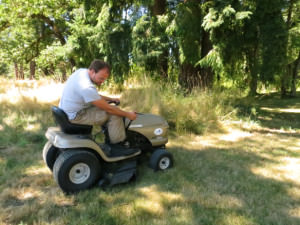 The Pacific Northwest is known for its rainy days, but the summer usually brings lots of sun. As you might guess, this is a great recipe for plants to grow, more specifically, grass. The animal care staff tries to mow the grass in the sanctuary on the footpaths outside of the enclosures on Tuesdays, since we are closed for visits. Our mowing routine is nothing out of the ordinary; one person cuts the roads with the rider mower, two people weed whack closer to the fences and around obstacles. As with everything that needs to get done in the sanctuary, we do it with the animal’s well-being and comfort as the top priority.
The Pacific Northwest is known for its rainy days, but the summer usually brings lots of sun. As you might guess, this is a great recipe for plants to grow, more specifically, grass. The animal care staff tries to mow the grass in the sanctuary on the footpaths outside of the enclosures on Tuesdays, since we are closed for visits. Our mowing routine is nothing out of the ordinary; one person cuts the roads with the rider mower, two people weed whack closer to the fences and around obstacles. As with everything that needs to get done in the sanctuary, we do it with the animal’s well-being and comfort as the top priority.
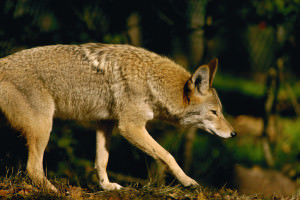 Wolves are neophobic, or afraid of new things. Unlike dogs, wolves are not very brave and outgoing when it comes to new things in their environment. Coyotes are braver than wolves which is why they have been so successful integrating with people and our urban ways. So when it comes to cutting grass, you would expect our residents to stay away from us and the mowers. Guess again! There seems to be two reactions to mowing day; indifference, and curiosity.
Wolves are neophobic, or afraid of new things. Unlike dogs, wolves are not very brave and outgoing when it comes to new things in their environment. Coyotes are braver than wolves which is why they have been so successful integrating with people and our urban ways. So when it comes to cutting grass, you would expect our residents to stay away from us and the mowers. Guess again! There seems to be two reactions to mowing day; indifference, and curiosity.
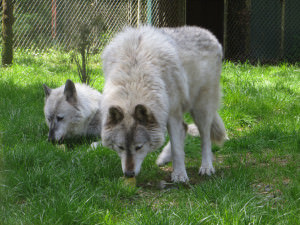 Indifference. There are some residents that just don’t seem to care that the animal care staff is operating loud machinery. Indifference is mostly manifested by them continuing to lie on the ground or carrying on with their normal routine. Some indifferent wolves include Jesse and Shiloh and Mehina and Klondike.
Indifference. There are some residents that just don’t seem to care that the animal care staff is operating loud machinery. Indifference is mostly manifested by them continuing to lie on the ground or carrying on with their normal routine. Some indifferent wolves include Jesse and Shiloh and Mehina and Klondike.
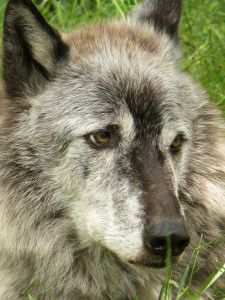 Curiosity. This is the reaction most residents have and it baffles me. Mowing day is met not with fear, but active interest. Even skittish animals seem to have a newfound bravery when the mower is around. Since Shoka arrived at the sanctuary, he has been wary of me. I catch glimpses of him and hear huffs as I walk past during feeding or doing the walkthrough. I do what needs to be done and I move on. But just this morning as I was on the rider mower, I went past Shoka’s enclosure and he was about five feet away from the fence just watching. No huffing. No running to the back of the enclosure. Just watching.
Curiosity. This is the reaction most residents have and it baffles me. Mowing day is met not with fear, but active interest. Even skittish animals seem to have a newfound bravery when the mower is around. Since Shoka arrived at the sanctuary, he has been wary of me. I catch glimpses of him and hear huffs as I walk past during feeding or doing the walkthrough. I do what needs to be done and I move on. But just this morning as I was on the rider mower, I went past Shoka’s enclosure and he was about five feet away from the fence just watching. No huffing. No running to the back of the enclosure. Just watching.
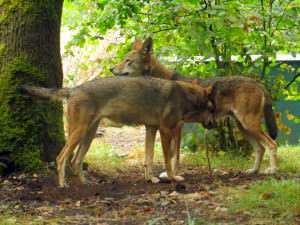 Red wolves Ruby and Tala, while hard to see on visits, are often at the fence in full view while we are mowing the grass. Same goes for the coyotes. Some wolves like Lonnie, will rub the fence line after the mower or weed whacker has passed to get the fresh-cut grass smell. After all, who doesn’t like that?
Red wolves Ruby and Tala, while hard to see on visits, are often at the fence in full view while we are mowing the grass. Same goes for the coyotes. Some wolves like Lonnie, will rub the fence line after the mower or weed whacker has passed to get the fresh-cut grass smell. After all, who doesn’t like that?
Splish Splash
by Brennan Stoelb, Animal Care Specialist, Wolf Haven International
In a recent blog I mentioned that it has been hot here in western Washington. Read it here…… While on most hot days the wolves lay in the shade to keep cool, Wolf Haven also provides other means to beat the heat; splash tubs.
For the animals that enjoy wading in water, animal care places 45 gallon, galvanized tanks in their enclosure. Not every enclosure has a tank because, just like humans, not every wolf likes to get wet. The tubs are about a foot and a half tall, just enough to be below their stomachs. They’ll jump in the tub and begin pawing the water to make it splash. Lakota and Shadow are two residents who love their tubs.
As you might assume, all this playing in the tub can make for some messy water. Every week animal care scrubs the tubs and replaces the dirty water with clean. In some cases the water will be changed more frequently. Daily we top-off the tubs to replace any water that’s been splashed out. With sponges and diluted bleach in hand, we go about the task of cleaning. Not only does dirt and fur cloudy up the water, it’s not uncommon to see someone peeing in their tub. Nothing is better than filling a tub with cool, clean water, only to have them hop in and pee – to each his own, as they say. Sometimes during feeding, a piece of meat will fall the wrong way and land in the tub.
One day when I was feeding a treat to Lakota, a piece fell in the tub. Not to let a little water stand in his way, Lakota stuck his head in the water, over his eyes, and sort of “bobbed” for his treat. Unfortunately, he was unsuccessful. I threw him a replacement, which he ate, but he went back to the tub and pawed the surface of the water, ever hopeful that it may float to the surface.
It surprises some people to hear that wolves can swim. They have webbing between their toes to help them move more easily on snow and uneven surfaces. This webbing also helps when swimming. Wolves will cross streams while chasing prey but
photographers captured one young wolf in Canada swimming to catch a goose. Perhaps his “rubber ducky?”
On Lake Superior in northern Michigan there is an island called Isle Royale. Once connected by a predictable ice bridge in the winter, Isle Royale has become a subject of recent debate. Home to a 56 year study on moose and wolf interactions, the island’s wolves are in decline. According to the annual report, there are nine wolves on the island, two of which are female. Scientists are concluding that the decline is a result of inbreeding both in prey and predator, since no new genetics are regularly coming to the island. To get to the island, wolves would have to swim about 15 miles. In 1997, a wolf from Canada affectionately called, “The old grey guy,” crossed the ice bridge and became a successful breeder. The debate amongst scientists is whether humans should intervene by bringing new genes to the island or let nature take its course. For more information on Isle Royale visit www.isleroyalewolf.org.
So if the heat gets to you this summer, do what the wolves do – and take a dip!
